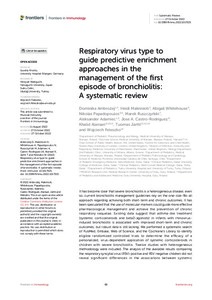Respiratory virus type to guide predictive enrichment approaches in the management of the first episode of bronchiolitis: A systematic review
Ambrożej Dominika; Makrinioti Heidi; Whitehouse Abigail; Papadopoulos Nikolas; Ruszczyński Marek; Adamiec Aleksander; Castro-Rodriguez Jose A.; Alansari Khalid; Jartti Tuomas; Feleszko Wojciech
https://urn.fi/URN:NBN:fi-fe2022121371188
Tiivistelmä
It has become clear that severe bronchiolitis is a heterogeneous disease; even so, current bronchiolitis management guidelines rely on the one-size-fits-all approach regarding achieving both short-term and chronic outcomes. It has been speculated that the use of molecular markers could guide more effective pharmacological management and achieve the prevention of chronic respiratory sequelae. Existing data suggest that asthma-like treatment (systemic corticosteroids and beta2-agonists) in infants with rhinovirus-induced bronchiolitis is associated with improved short-term and chronic outcomes, but robust data is still lacking. We performed a systematic search of PubMed, Embase, Web of Science, and the Cochrane’s Library to identify eligible randomized controlled trials to determine the efficacy of a personalized, virus-dependent application of systemic corticosteroids in children with severe bronchiolitis. Twelve studies with heterogeneous methodology were included. The analysis of the available results comparing the respiratory syncytial virus (RSV)-positive and RSV-negative children did not reveal significant differences in the associatons between systemic corticosteroid use in acute episode and duration of hospitalization (short-term outcome). However, this systematic review identified a trend of the positive association between the use of systematic corticosteroids and duration of hospitalization in RSV-negative infants hospitalized with the first episode of bronchiolitis (two studies). This evidence is not conclusive. Taken together, we suggest the design for future studies to assess the respiratory virus type in guiding predictive enrichment approaches in infants presenting with the first episode of bronchiolitis.
Kokoelmat
- Rinnakkaistallenteet [27094]
